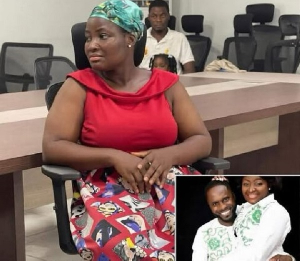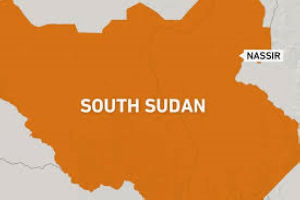A GNA Feature by Samuel Osei-Frempong
Accra, Aug. 8, GNA - Sounds of drums; tam-tam and high pitch songs, audible at a distance, led the way for a bus-full of unusual visitors, who struggled on a rocky and dusty road to Sanga, a small community in the Volta Region.
The people of Sanga were celebrating the new water system provided them recently under the direction of the Community Water and Sanitation Agency (CWSA).
Water is life; so the people would make a new song to celebrate the time, thought and energy pumped to make this 'feat' a reality. A young girl, Aku, dressed in a strip of calico danced behind the long queue of adults to express her joy.
She saw the event as a special one; not because she would be seeing Members of Parliament and Ministers of State in person for the first time but for the fact that her daily tortuous journey to the stream had come to an end.
The dignitaries undertook the trip as part of their retreat in a conference hall overlooking the ever-scenic Akosombo Dam where the beauty of the Volta River can be savoured as it rolls into the horizon between elegant hills.
Until recently, Aku, 12, woke up before sunrise and walked some kilometres to a water source to fetch untreated water for her family. Scores of children would compete with elderly women and muddy the spring water in their haste to get into their calabashes the first gush even before she got there.
Her feeble limbs did not allow her to carry a container that could take enough water for the family consisting of a father, a mother and a baby brother after a trip so she embarked on countless trips till sunset.
Such conditions did not allow one to consider sending the female child to school especially in a community where females are less prized than males.
The thoughts of river gods and the strange belief that the foot sounds of one carrying water could even determine one's fate will no longer bother her.
The Sanga project is one of the numerous water systems developed by the CWSA to help small communities and towns to access clean water. Such projects are normally modest and simple. It involves either mechanisation of boreholes or the development of springs, fitted with pipes that brought clean water closer to the user.
The CWSA has some interesting ideas. The farthest consumer should not live more than five hundred metres from a water system, which comes in several forms such as boreholes and hand-dug wells. Currently, more than a thousand systems developed by the CWSA and others developed and abandoned by nongovernmental organisations (NGOs) plus the big urban water system care for only 48 per cent of the Ghanaian population.
Ghana needs close to 400 million dollars to provide clean water to 85 per cent of her population. Such an investment would minimise substantially the high prevalence rate of water-borne diseases such as guinea worm.
Interestingly, only 5,000 dollars are needed to make a borehole and out of this amount, beneficiary communities pay five per cent. But where resources are scarce, people struggle to control its source. Politicians feed on the vulnerability of the water-poor in their zeal to win votes and power and glory.
The Member of Parliament for Chereponi told a story of how the Water and Sanitation Board in one of the communities is dominated by a family of politicians.
The Water and Sanitation Boards are made up of people in the locality trained by the CWSA to manage small water systems in their communities.
Officials of the CWSA have scores of stories on how politicians deliberately confuse the local population to believe that paying a token five per cent of the cost of making water available was evil. The argument they normally make is that; why should the rural person pay money towards the construction a water system when those in the urban areas pay nothing?
This argument sounds convincing when heard at first time but after taking several factors into consideration, one would come to dismiss it as a mere populist rhetoric.
Urban water users pay two and half per cent of what they consume towards rural water development. Various research findings point to the fact that without contributing towards the making of water systems in the rural communities, there would be no sense of ownership among the users.
It is also very crucial because the CWSA would not be able to monitor all the systems on round-the-clock basis as the Ghana Water Company Limited (GWCL) can do with the bigger systems in urban areas. The sense of communality in the rural areas that make them reason like a big family cannot be found in the urban setting where the rules of social engagement are different; the urban dweller is more individualistic.
Finding money to finance this noble objective has become national nightmare. Ghana at the moment invests 2.4 per cent of her total developmental budget on water and sanitation.
Every year the deficit compounds the problem thus denying a poor child in a rural community the right to a cup full of clean drinking water.
Ideas have been toasted around for sometime on how to harness the required resources to make this dream a reality.
Some have called for a Water fund, others have dreamt of "water bonds" to raise the needed resources.
"Considering the fact that we need more than 400 million dollars to provide clean water for about 85 per cent of our people, a water fund, would be an ideal way of getting some of the money' Mr Kofi Asamoah, Executive Officer of CWSA said.
But the conduits through which the money is to flow into the fund remains the unsolved portion of the jigsaw.
CWSA does not receive the two and half per cent of urban water billing from GWCL, a source, which he argues, could rake in substantial revenue.
With the water bonds, the proponents of this idea say that the issuing of bonds, just like any form of government borrowing to build water infrastructure, will not only bring in resources but also highlight the importance of the sector.
There is idle money in the hands of people who are looking for a good place to make money. There is a price to pay by society to take people from ponds, where they compete with beasts to access this vital commodity.
In an environment where water is subjected to continuing inequities of use and access, where too many actors, institutions and too little co-ordination, where there is increasing competition for the scarce and finite resource, only a good water policy can hold the centre. Mr Mintah Ofosa Agyeman, Director of Water at the Ministry of Works and Housing, who is also the chief scribe of the yet to be unveiled "national water policy" says, "the policy would avoid conflicts among the actors and at the same time reinforce their bonds."
It would uphold the fundamental rights of all people without discrimination to safe and adequate water and enhance the popular participation in its management at the local level.
The policy, which may engage the attention of Cabinet in September, takes a critical look at polluters as "polluters would pay for any mess" clause enjoys prominence.
Could this policy lead to a Water Ministry eventually? Ghana is currently only better off than war-ravaged Sudan when it comes to the eradication of guinea worm. And there is the need to play up the importance of water even within the political context. The management of water is a political issue as it concerns choices of technology, funding and strategies for sector-specific human resource development.
Clean water is the key to a guinea worm free society. Other troublesome water-borne diseases disappear when clean water flows through the taps.
There are many children who are waiting for the day when stories about river gods would no longer bother them, when occupying a seat in the classroom means more to a parent than the task of drawing water, when the tiny long whitish worm would cease causing excruciating pain. If the popular assertion that for every dollar invested in water and sanitation, thirty-four dollars are saved; controllers of the people's purse should reconsider the spending patterns.
As the bus carrying the visitors left the merry making people of Sanga, the urge to make water a common resource for all became stronger: It should no longer be the mirror that reflects the contradictory faces of unlimited privilege for the few and limitless poverty for many. 8 Aug. 05
Opinions of Monday, 8 August 2005
Columnist: GNA














